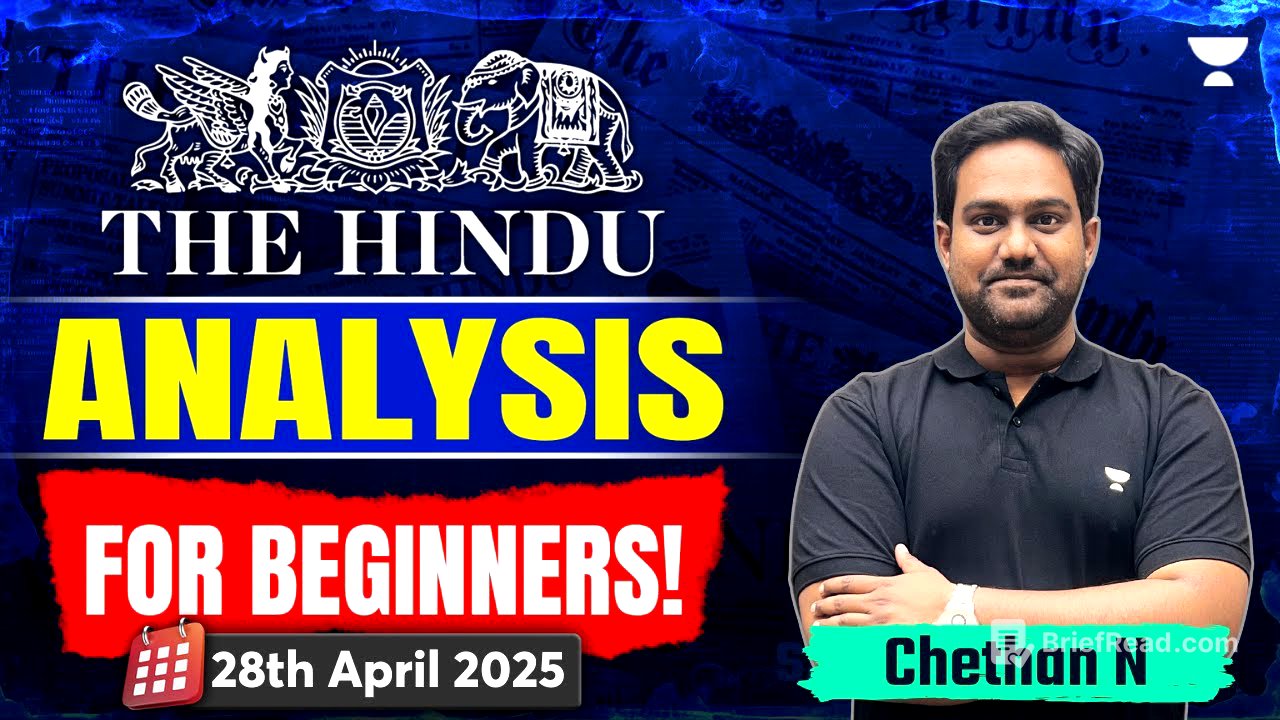TLDR;
This YouTube video provides a detailed analysis of several articles from The Hindu newspaper, focusing on their implications for the UPSC civil services exam. The discussion spans topics from the environmental and financial challenges of artificial intelligence in India to the complexities of arbitration, transgender rights, and the political trillemma of democracy, sovereignty, and globalisation. Additionally, the video covers updates on cybercrime coordination, maritime disputes in the South China Sea, a tragic explosion in Iran, and the impact of the cucumber mosaic virus (CMV) on food security.
- Environmental and financial challenges of AI in India
- Streamlining arbitration processes and the rights of the transgender community
- Political trillemma of democracy, sovereignty and globalisation
- Recent updates relevant to prelims, including cybercrime, maritime disputes, and plant viruses
Introduction [0:08]
The presenter welcomes viewers to Unacademy IAS English, a platform for civil service aspirants. They outline the day's agenda, which includes a detailed analysis of eight articles from The Hindu, with a focus on five articles relevant to both prelims and mains exams, and four smaller articles for prelims. The presenter encourages viewers to support the initiative by liking, commenting, and subscribing to the channel, and informs them that the PDF of the session will be shared on their Telegram channel. They also announce a special offer on Unacademy IAS courses to celebrate the success of their students.
AI: Environmental and Financial Challenges [2:18]
The presenter combines two articles discussing artificial intelligence, one focusing on the environmental costs and the other on the financial challenges in India. A recent IMF report highlights the significant electricity consumption and infrastructure needed for AI, with companies like Open AI incurring substantial costs due to user politeness in prompts. While the IMF report suggests the economic gains from AI will outweigh the environmental consequences, setting up AI infrastructure will strain the environment through increased mining for critical minerals, waste generation, and pollution. India's AI mission aims to address these challenges by investing in clean, renewable energy sources like solar, wind, and nuclear power.
Financing AI Infrastructure in India [11:09]
The Ministry of Electronics and IT has notified a procurement policy for AI infrastructure under the India AI mission, which aims to establish government-owned AI infrastructure and collaborate with the private sector. The policy includes a continuous empanelment process for vendors to supply infrastructure, promoting competition and preventing monopolisation. While this approach is beneficial in the short term, it may lead to vendors compromising on quality to submit the lowest bids, potentially harming India's AI innovation ecosystem in the long run. Strict eligibility criteria for startups and tech companies to access the AI infrastructure may also exclude smaller players, hindering innovation and causing bureaucratic delays.
Arbitration in India [22:55]
Arbitration is discussed as an alternative dispute resolution mechanism, crucial for contractual enforcement and economic growth. However, India's arbitration process is complex and mirrors the judicial system, with arbiters often being former judges or advocates. This leads to delays and ineffective solutions, causing Indian companies to seek arbitration in other jurisdictions like Singapore. The presenter argues for streamlining the arbitration process, ensuring the right human capital is allotted, and bringing in specialist arbiters to speed up the process and aid India's economic progress.
Transgender Rights [29:33]
The editorial discusses the rights of the transgender community, a topic of debate, particularly in Western countries. Recent rulings in the UK and actions in the US show a divisive approach, with attempts to curb trans rights due to misuse. The presenter highlights that the trans community is a vulnerable section of society facing discrimination and oppression. India's 2019 legislation, the Protection of Transgender Rights Act, provides a sweeping set of rights for the third gender. The editorial urges India to protect these rights while addressing cases of misuse, cautioning against disenfranchising the entire community for the mistakes of a few.
Political Trillemma [35:36]
The presenter introduces the political trillemma theory by economist Danny Rodrik, which posits a conflict between democracy, globalisation, and sovereignty. Countries must choose between these three, as fully ensuring all three is impossible. The European Union is given as an example of prioritising democracy and globalisation, which compromised the individual sovereignty of its member nations, leading to sentiments like Brexit. India, on the other hand, has chosen the Bretonwood compromise, embracing democracy and sovereignty while accepting limited globalisation. China has prioritised sovereignty and globalisation at the cost of democracy. The presenter concludes that democracy must be upheld at any cost, with potential compromises on globalisation or sovereignty.
Cyber Crime Coordination Center [46:42]
The Indian Cyber Crime Coordination Center (I4C) has been listed under section 66 of the Prevention of Money Laundering Act (PMLA). This change recognises the linkages between cyber frauds and money laundering, allowing I4C to share information with law enforcement agencies like the Enforcement Directorate (ED). This move will strengthen India's fight against money laundering and cyber frauds, especially those linked with money laundering.
South China Sea Dispute [49:56]
The South China Sea dispute, particularly around the Spratlay Islands, is discussed. China's claims over the exclusive economic zone (EEZ) go against the sovereignty of countries like the Philippines, Vietnam, Malaysia, Indonesia, and Brunai. The Philippines and the US have strengthened their defence relations, conducting annual military exercises like the Bali Katan exercise. China has claimed full maritime control over Txian reef (also called Sandy K), a small sand bank near the T2 island, which belongs to the Philippines.
Explosion at Iranian Port [54:10]
A massive explosion at the Shahid Rajay port in Bandhar Abbas, Iran, resulted in numerous casualties. The port is strategically vital due to its location at the opening of the Straight of Hormuz, through which a significant portion of global oil supplies passes. While the cause is speculated to be a chemical explosion, conspiracy theories about an Israeli covert attack exist. The incident could disrupt operations at the port, which is linked to India's INSTC project.
Cucumber Mosaic Virus (CMV) [57:22]
The cucumber mosaic virus (CMV) is identified as a deadly plant virus affecting numerous plant species and impacting crop yield. It is spread by aphids and results in stunted growth and mosaic patterns on fruits and vegetables. CMV contributes to food wastage and insecurity, causing significant yield losses in crops like bananas, cucumbers, and melons. Researchers have developed an RNA-based antiviral treatment to combat CMV and protect plant yields.









